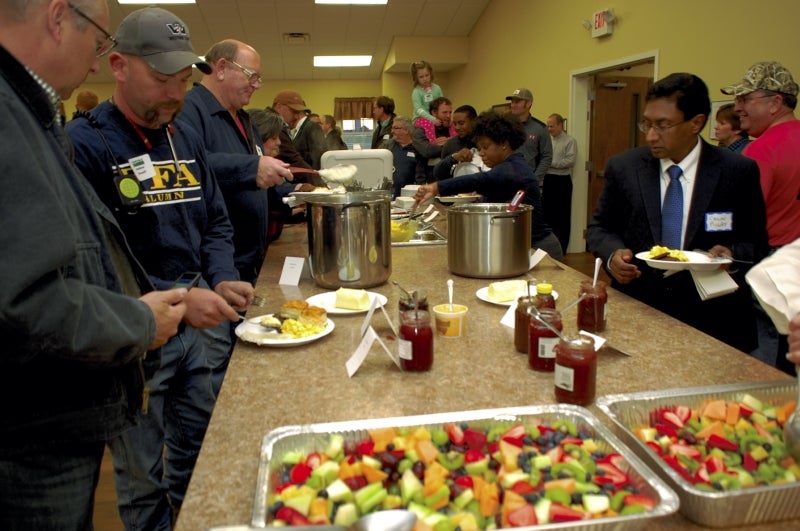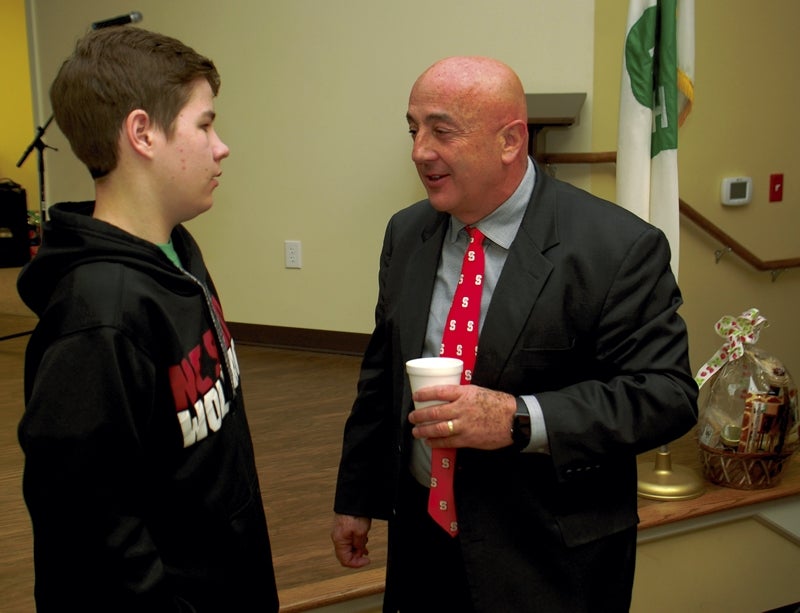Urbanization, food safety regulations among challenges facing N.C. farming, speaker says
Published 12:10 am Friday, March 17, 2017
By Mark Wineka
mark.wineka@salisburypost.com
BEAR POPLAR — On another subfreezing morning — one posing serious threats to Rowan County’s fruit and wheat crops — farmers. businessmen and local leaders gathered Thursday for breakfast to talk about agriculture’s importance.
Rich Bonanno, director of N.C. State Cooperative Extension, told a crowd of more than 250 people at St. Luke’s Lutheran Church that one of the future challenges for N.C. agriculture is increasing urbanization.
More people living in urban areas will change the faces of legislators and intensify farmers’ concerns about state funding for agriculture. It will be more important than ever, Bonanno said, “to connect them back to what we do.”
The urban legislators of tomorrow will increasingly be asking, “Why should we care?” about agriculture, Bonanno said, and one of the first questions in response should be, “How many people are in your district?”
It’s that many people who depend on agriculture, said Bonanno, who also is an associate dean in the College of Agriculture and Life Sciences at N.C. State University.
“No matter what anybody is doing, everybody is eating,” he added. “… All agriculture is important; all farmers are important.”
Bonanno served as keynote speaker Thursday for the Rowan County Chamber of Commerce’s fourth annual Farmers Appreciation Breakfast. Locally produced foods were prepared by the St. Luke’s Lutheran men’s group. The menu included sausage, livermush, eggs, grits, gravy, fruits, jams, honey, biscuits, bread and grape juice.
The local food came from Frank Corriher Sausage, Wild Turkey Farms, Patterson Farm, Cauble Creek Vineyard, Overcash Farms, Moore Farms, Renn Bee Farm and the Piedmont Research Station.
Many people went home with goodie bags that included Fading D Farm cheese, Patterson Farm jam and Morgan Ridge Vineyard wine.
Michelle Patterson of Patterson Farm serves as chairwoman for the chamber’s Agri-Business Committee. She reminded the crowd that agribusiness is an $84 billion economic driver for the state and that N.C. Agriculture Commissioner Steve Troxler has set a goal of making it a $100 billion industry.
Agriculture remains North Carolina’s top industry.
Elaine Spalding, president of the chamber, said the annual breakfast is a way to recognize and thank farmers for putting food on the table. First National Bank (formerly Yadkin Bank) was the program’s primary sponsor.
Bonanno has been director of Cooperative Extension since 2015. He said county extension agents are field faculty members who give unbiased information backed by experiments, experience and research.
The 600 extension personnel in the state’s 100 counties are supported by 170 faculty members at N.C. State and N.C. A&T State University who have extension as part of their job duties, along with research.
University research on behalf of N.C. farmers will be greatly enhanced in coming years by construction of a $160 million, 190,000-square-foot plant sciences building on the N.C. State University campus. Bonanno said it will be the largest building on campus and the premier research center for interdisciplinary plant sciences in the nation.
The $2 billion in Connect N.C. Bonds passed by voters in March 2016 provided $85 million for the plant sciences building. The Golden LEAF Foundation is accounting for an additional $45 million and commodity groups and other donations amount to $14 million, so that the university is within 10 percent of its goal.
Bonanno said the building should be complete by the fall of 2021, with a groundbreaking probably in 2018.
Bonnano also spoke of the growing challenges for students to gain entry into N.C. State. The average SAT score is now about 1260 to 1270, he said.
One thing that could make a difference for a lot of agriculture and rural students, Bonanno said, is taking advantage of the extension office’s nomination program, in which students are given recommendations from people in their communities.
Bonnano noted that eight area specialized agents with N.C. Cooperative Extension are working now in food safety, and he warned that implementation of the Food Safety Modernization Act has the potential to push many smaller growers out of business by making food handling too expensive.
Of 55,000 farms in the state, Bonnano said, 70 percent are grossing $50,000 a year or less, and they are looking at roughly $5,000 a year in costs to comply with food safety regulations, which are basically a matter of common sense.
“It’s hard to make that all come together,” he said. “… We’re trying to get some reality in this.”
Also participating in Thursday’s program were Rowan County Cooperative Extension Director Amy-Lynn Albertson, Sacred Heart Catholic School, Millbridge Community Garden Club, West Rowan High Future Farmers of America and 4-H students in the county.
Other program sponsors Thursday included the Rowan County Farm Bureau, Mount Ulla Gardens, Correll Farms/Red Barn Market, Rustic Edge Soaps, Baker Mill Boer & Dairy Farm, L.L. Goodnight & Sons, BNC Bank, Novant Health, Rowan Hospice & Palliative Care, Lazy 5 Vets, Lazy 5 Ranch, Old Town Soap Co., Southern States, Farm Credit Carolina and James River Equipment.
Miller Davis Agency produced a a video tribute to Rowan County farmers that was shown at the end of the program.
Contact Mark Wineka at 704-797-4263.







